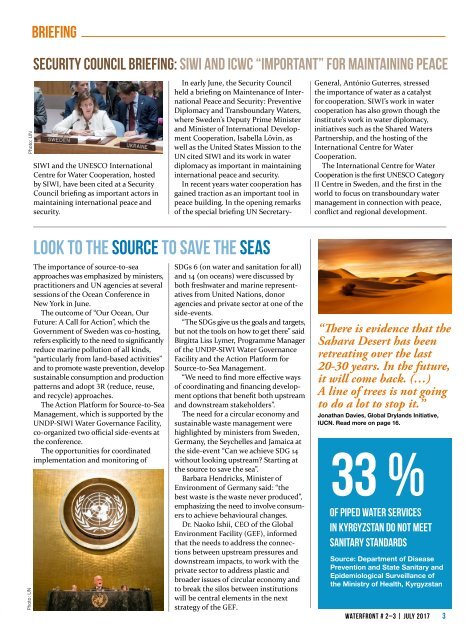Stockholm Water Front no 2-3 2017
Create successful ePaper yourself
Turn your PDF publications into a flip-book with our unique Google optimized e-Paper software.
Photo: UN<br />
briefing<br />
Security Council briefing: SIWI and ICWC “important” for maintaining peace<br />
SIWI and the UNESCO International<br />
Centre for <strong>Water</strong> Cooperation, hosted<br />
by SIWI, have been cited at a Security<br />
Council briefing as important actors in<br />
maintaining international peace and<br />
security.<br />
In early June, the Security Council<br />
held a briefing on Maintenance of International<br />
Peace and Security: Preventive<br />
Diplomacy and Transboundary <strong>Water</strong>s,<br />
where Sweden’s Deputy Prime Minister<br />
and Minister of International Development<br />
Cooperation, Isabella Lövin, as<br />
well as the United States Mission to the<br />
UN cited SIWI and its work in water<br />
diplomacy as important in maintaining<br />
international peace and security.<br />
In recent years water cooperation has<br />
gained traction as an important tool in<br />
peace building. In the opening remarks<br />
of the special briefing UN Secretary-<br />
General, António Guterres, stressed<br />
the importance of water as a catalyst<br />
for cooperation. SIWI’s work in water<br />
cooperation has also grown though the<br />
institute’s work in water diplomacy,<br />
initiatives such as the Shared <strong>Water</strong>s<br />
Partnership, and the hosting of the<br />
International Centre for <strong>Water</strong><br />
Cooperation.<br />
The International Centre for <strong>Water</strong><br />
Cooperation is the first UNESCO Category<br />
II Centre in Sweden, and the first in the<br />
world to focus on transboundary water<br />
management in connection with peace,<br />
conflict and regional development.<br />
Photo: UN<br />
Look to the source to save the seas<br />
The importance of source-to-sea<br />
approaches was emphasized by ministers,<br />
practitioners and UN agencies at several<br />
sessions of the Ocean Conference in<br />
New York in June.<br />
The outcome of “Our Ocean, Our<br />
Future: A Call for Action”, which the<br />
Government of Sweden was co-hosting,<br />
refers explicitly to the need to significantly<br />
reduce marine pollution of all kinds,<br />
“particularly from land-based activities”<br />
and to promote waste prevention, develop<br />
sustainable consumption and production<br />
patterns and adopt 3R (reduce, reuse,<br />
and recycle) approaches.<br />
The Action Platform for Source-to-Sea<br />
Management, which is supported by the<br />
UNDP-SIWI <strong>Water</strong> Governance Facility,<br />
co-organized two official side-events at<br />
the conference.<br />
The opportunities for coordinated<br />
implementation and monitoring of<br />
SDGs 6 (on water and sanitation for all)<br />
and 14 (on oceans) were discussed by<br />
both freshwater and marine representatives<br />
from United Nations, do<strong>no</strong>r<br />
agencies and private sector at one of the<br />
side-events.<br />
“The SDGs give us the goals and targets,<br />
but <strong>no</strong>t the tools on how to get there” said<br />
Birgitta Liss Lymer, Programme Manager<br />
of the UNDP-SIWI <strong>Water</strong> Governance<br />
Facility and the Action Platform for<br />
Source-to-Sea Management.<br />
“We need to find more effective ways<br />
of coordinating and financing development<br />
options that benefit both upstream<br />
and downstream stakeholders”.<br />
The need for a circular eco<strong>no</strong>my and<br />
sustainable waste management were<br />
highlighted by ministers from Sweden,<br />
Germany, the Seychelles and Jamaica at<br />
the side-event “Can we achieve SDG 14<br />
without looking upstream? Starting at<br />
the source to save the sea”.<br />
Barbara Hendricks, Minister of<br />
Environ ment of Germany said: “the<br />
best waste is the waste never produced”,<br />
emphasizing the need to involve consumers<br />
to achieve behavioural changes.<br />
Dr. Naoko Ishii, CEO of the Global<br />
Environment Facility (GEF), informed<br />
that the needs to address the connections<br />
between upstream pressures and<br />
downstream impacts, to work with the<br />
private sector to address plastic and<br />
broader issues of circular eco<strong>no</strong>my and<br />
to break the silos between institutions<br />
will be central elements in the next<br />
strategy of the GEF.<br />
“There is evidence that the<br />
Sahara Desert has been<br />
retreating over the last<br />
20-30 years. In the future,<br />
it will come back. (…)<br />
A line of trees is <strong>no</strong>t going<br />
to do a lot to stop it.”<br />
Jonathan Davies, Global Drylands Initiative,<br />
IUCN. Read more on page 16.<br />
33 %<br />
of piped water services<br />
in Kyrgyzstan do <strong>no</strong>t meet<br />
sanitary standards<br />
Source: Department of Disease<br />
Prevention and State Sanitary and<br />
Epidemiological Surveillance of<br />
the Ministry of Health, Kyrgyzstan<br />
WATERFRONT # 2–3 | JULY <strong>2017</strong><br />
3


















